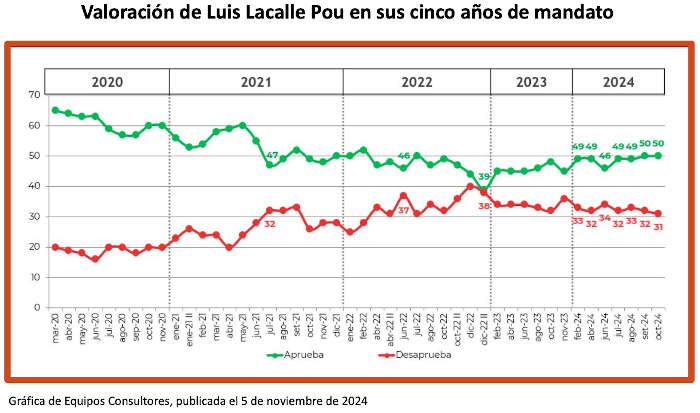In the picture
visit Lacalle Pou, during an official visit to the city of Lascano [Presidency of Uruguay] [Presidencia de Uruguay].
Luis Lacalle Pou is advancing towards the end of his five-year term in office in Uruguay with a high approval rating. This support for his management, however, he has not been able to transfer it to the ruling candidate in the November elections, and the opposition Yamundú Orsi, of the Frente Amplio, will assume the presidency on March 1, 2025. The government of Lacalle Pou, of the National Party and at the head of a coalition of right and center-right, succeeded fifteen years of management of the Frente Amplio and will now hand over the baton again to that leftist movement. The quiet alternation underlines the remarkable institutionalism of the country, also evidenced by the rather general applause for the current president's management .
The government headed by Lacalle Pou marked the end of 15 years of Frente Amplio government in Uruguay. In a troubled economic and security context, the president developed liberalizing projects, opening the country more to the world and subtly abandoning his traditional position of mediator. Even facing a pandemic and several political crises, Lacalle Pou ended his term in office with high levels of evaluation, as he was able to adopt policies that meant progress for the Eastern Republic of Uruguay.
Domestic policy
topic SECURITY-Securitywas a major focus of President Lacalle Pou's campaign, but during his term in office there was little progress: crimes of petty theft, robbery, and cattle rustling declined, but there was weakness in homicide crimes. Some critics say that the government failed to address the root causes of crime, and identify problems in the policies adopted. The focus was placed on predatory crime, despite the continuous drop in the levels of complaints, and money laundering was facilitated, which increased drug trafficking, making Uruguay an attractive place for these activities, and punitive policies were used instead of attacking organized crime head on, resulting in situations of incarceration for bringing marijuana into prison while major drug traffickers serve sentences without imprisonment. The lack of initiative to provide resources to the security forces is also criticized. As a last reform, an attempt was made to promote through a plebiscite a constitutional reform that would enable night raids to reduce crime, but the necessary majorities were not reached due to the opposing vote promoted by civil service examination.
Economics/FISCAL POLICY-TheNational Party (PN) proposed to promote progress through the private sector and agro-industrial exports, and to diversify free trade agreements, in order to improve productivity levels, correct the fiscal deficit and reduce expenditures. A liberal stance was taken, seeking an austere and efficient government that would promote functional reorganization, debureaucratization and accountability. In addition, certain areas were identified as requiring specific treatment, such as MSMEs and road, rail and port infrastructure. The government achieved the approval by referendum of an omnibus law, known as the Law of Urgent Consideration, which allowed it to promote measures to liberalize the Economics, reform the state and strengthen the punitive orientation in security. After almost 5 years of government, macroeconomic figures show stability and improvement in GDP growth.
SOCIAL PROTECTION-Stabilitywas achieved and foreign investment was attracted, through the prioritization of a pro-market approach , but this also implied leaving aside the role of the State in the market and social protection, issues that seemed consolidated in the country after 15 years of socialist government. The employment and salaries recovered in the last period of government, after being affected at the beginning, while the poverty level closed at higher figures than it was at the time of Lacalle Pou's arrival; some critics claim that income increases only benefited the highest sectors of society.
management OF THE PANDEMIC-Consideringthat the government debuted with the management of Covid-19, it is surprising that it has come out stronger in terms of public opinion. The President excelled in adopting a 'freedom manager' and non-confinement stance. He achieved an extensive voluntary adherence of the citizenry to the light restrictions of movement and development of activities, and promoted social programs to mitigate the economic impact on the most vulnerable sectors. It is remarkable that, despite having started with a pandemic, the government has achieved stability, openness and growth.


